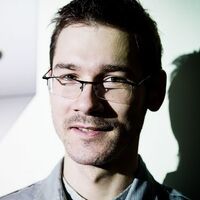The award-winning computer scientist trains computers to recognize a person by gait

Balážia's biometric system that distinguishes people by walking is expected to combine with a face recognition system. This will allow people who are similar in the face to be recognized.
Michal Balážia, a recent PhD graduate from the Faculty of Informatics at Masaryk University, took home the Joseph Fourier Prize in Computer Science from the French Embassy as far as Florida. A few weeks ago, he received an award for the development of a biometric system that can distinguish people based on the nature of walking aka gait. Paradoxically, his research now lies dormant. Thanks to the price, though, Balážia might be able to continue again.
The moment when he could shake hands with the Nobel Prize laureate, who presented him with the award, was the culmination of several years of work for Michal. He already dealt with the topic of human motion detection in his master’s thesis, which he submitted in 2013. Finally, at the end of the doctorate program, a model based on machine learning emerged, which surpasses 13 relevant previously used methods in recognition success.
"Together with my advisor Petr Sojka, we designed a model that can recognize the identities of any people, regardless of the participants in the training group. This biometric system is expected to combine with a face recognition system. This will enable the recognition of people who are similar in the face", Michal described the results of his efforts, which could be useful in the field of security.
The great potential of the topic was one of the aspects why the Faculty of Informatics MU nominated Michal for the award. "We scientists are a bit like little children; someone has to keep throwing some candy at us to keep working. That is why I was very pleased with the nomination; it is a great award. There were already many great ideas among my colleagues in Brno“, said the young computer scientist, who travelled to the embassy without knowing whether he would win his category.
He received the invitation with the information that he was among the top four and he certainly did not believe in the overall victory. "Part of the process was an interview with the committee, where I could not be physically present because I was abroad. So I was interviewed in pajamas on Skype with a time shift sometime early in the morning. I had the impression that my answers did not even make sense. In addition, everyone else had great presentations and interesting projects", he explained his surprise.
Right now, Michal is unreachable in the Czech Republic or at home in Slovakia. He has been on a postdoctoral stay at the University of South Florida in Tampa Bay since mid-May. He is not continuing his research there in the Brno project now. He is dealing with a broader topic, which he describes as an analysis of incidents in videos. In layperson’s terms, it tries to train the computer to automatically evaluate exactly what actions are taking place on the recording, which is useful when analyzing recordings from security cameras. It is often impossible to watch all camera recordings with the help of human power alone.
However, Michal would like to return to his original topic, biometric analysis of gait. This is exactly what the Joseph Fourier Prize should help him with, which, in addition to a financial reward of 60,000 crowns, is also linked to arranging an internship at one of the French institutions. Michal already has a concrete idea of where he would like to go.
"We scientists are a bit like little children; someone has to keep throwing some candy at us to keep working. That is why I was very pleased with the nomination; it is a great award."
"I will complete the internship in the form of postdoctoral research, if possible and by agreement, either at IMT Lille Douai or at UEB Rennes, where I have academic contacts", said the computer scientist, who is already very much looking forward to France. Although he has only been in the United States since mid-May and already has a number of foreign experiences from North America or Asia, he finds it difficult to get used to Florida in his own words and is already looking forward to being back in Europe.